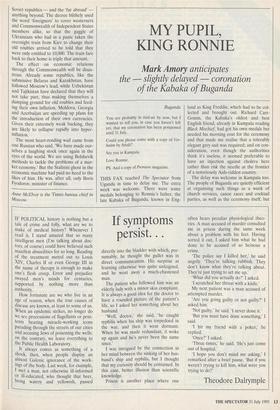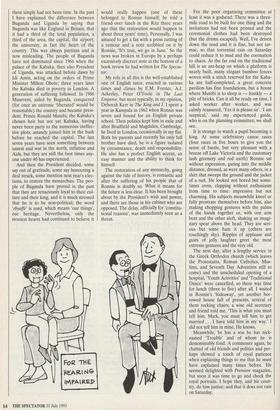MY PUPIL, KING RONNIE
Mark Amory anticipates
the — slightly delayed — coronation of the Kabaka of Buganda
Buganda
You are probably in mid-air by now, but I wanted to tell you, in case you haven't left yet, that my coronation has been postponed until 31 July.
Could you please come with a copy of Ver- batim by Attali?
See you in Kampala. Love Ronnie.
PS. And a copy of Premiere magazine.
THIS FAX reached The Spectator from Uganda in time to delay me. The extra week was welcome. There were some medals belonging to Ronnie's father, the late Kabaka of Buganda, known in Eng- land as King Freddie, which had to be col- lected and brought out. Richard Carr- Gomm, the Kabaka's oldest and best English friend, already in Kampala reading Black Mischief, had got his own medals but needed his morning coat for the ceremony and that made me realise that a tolerably elegant grey suit was required; and on con- sideration, even though the authorities think it's useless, it seemed preferable to have an injection against cholera here rather than risk the needle at the frontier of a notoriously Aids-ridden country.
The delay was welcome in Kampala too. The people of Buganda are quietly efficient at organising such things as a week of church services, canoe races and cocktail parties, as well as the ceremony itself, but there simply had not been time. In the past I have explained the difference between Buganda and Uganda by saying that Buganda was like England in Britain, that it had a third of the total population, a third of the area, the capital, the airport, the university, in fact the heart of the country. This was always partisan and is now misleading. The people of Buganda have not dominated since 1966 when the palace of the Kabaka, then also President of Uganda, was attacked before dawn by Idi Amin, acting on the orders of Prime Minister Milton Obote; three years later the Kabaka died in poverty in London. A generation of suffering followed. In 1986 Museveni, aided by Buganda, conquered (for once an unironic 'liberated' would be reasonable) the country and became presi- dent. Prince Ronald Mutebi, the Kabaka's chosen heir but not yet Kabaka, having never been party to the numerous ineffec- tive plots, astutely joined him in the bush before he reached the capital. The last seven years have seen something between unrest and war in the north, inflation and Aids, but they are still the best times any- one under 40 has experienced.
And then the President decided, some say out of gratitude, some say honouring a deal struck, some mention next year's elec- tions, to restore the monarchies. The peo- ple of Buganda have proved in the past that they are tenaciously loyal to their cul- ture and their king, and it is much stressed that he is to be non-political; the word `ebyaffe' is used, which means 'our things', our heritage. Nevertheless, only the stoutest hearts had continued to believe it would really happen (one of these belonged to Ronnie himself; he told a friend over lunch in the Ritz three years ago that the restoration would happen in about three years' time). Personally, I was amazed to get a fax with a press cutting of a rumour and a note scribbled on it by Ronnie, 'It's true, we go in June.' So the news was broken in Europe by a perhaps excessively discreet note at the bottom of a book review he had written for The Specta- tor.
My role in all this is the well-established one of English tutor, enacted in various times and climes by E.M. Forster, A.J. Ackerley, Peter O'Toole in The Last Emperor, but most typically, in my opinion, Deborah Kerr in The King and I. I spent a year in Kampala in 1962 when Ronnie was seven and bound for an English private school. Then politics kept him in exile and after Bradfield and Magdalen, Cambridge, he lived in London, occasionally in my flat. Both his parents and recently his only full brother have died, he is a figure isolated by circumstance, death and responsibility. He also has a perfect English accent, an easy manner and the ability to think for himself.
The restoration of any monarchy, going against the tide of history, is romantic and after the suffering of his people that of Ronnie is doubly so. What it means for the future is less clear. It has been brought about by the President's wish and power, and there are those in his cabinet who are opposed. The delay, officially for 'constitu- tional reasons', was immediately seen as a threat. For the poor organising committee at least it was a godsend. There was a three- mile road to be built for one thing and the invitations had not been printed and the ceremonial clothes had been destroyed (but the drums escaped). Well, I've driven down the road and it is fine, but not tar- mac, so that torrential rain on Saturday could reduce it to mud and the coronation to chaos. At the far end on the traditional hill is an ant-heap on which a platform is nearly built, many elegant bamboo fences woven with a stitch reserved for the Kaba- ka are half-completed, a great concrete pavilion has fine foundations, but a house where Mutebi is to sleep is — frankly — a pile of bricks. Can it all be ready on time, I asked worker after worker, and was calmly reassured, 'Yes it is please sir'. 'I am sceptical,' said my experienced guide, who is on the planning committee; we shall see.
It is strange to watch a pupil becoming a king. At some celebratory canoe races (four races in five hours to give you the sense of bustle, but very pleasant with a breeze off Lake Victoria and the customary lush greenery and red earth) Ronnie sat without expression, gazing into the middle distance, dressed, as were many others, in a shirt that sweeps the ground and the jacket of a suit. He looked not bored but some- times cross, clapping without enthusiasm from time to time: impressive but not charming. His subjects meanwhile kneel or fully prostrate themselves before him, also making chopping gestures with the palms of the hands together or, with one arm bent and the other aloft, shaking an imagi- nary spear above the head. They are seri- ous but some ham it up (others are touchingly shy). Ripples of applause and gusts of jolly laughter greet the most extreme gestures and the very old.
The next day, after a lengthy service in the Greek Orthodox church (which leaves the Protestants, Roman Catholics, Mus- lims, and Seventh Day Adventists still to come) and the unscheduled opening of a hospital, 'Youth Activities' and 'Traditional Dance' were cancelled, so there was time for lunch (three to five) after all. I waited in Ronnie's 'hideaway', yet another bor- rowed house full of presents, several of them rocking chairs; a wise old secretary and friend told me, 'This is what you must tell him, Mark, you must tell him to get married . . . I have told him in my way.' I did not tell him in mine. He knows.
Meanwhile, he has a son he has nick- named 'Trouble' and of whom he is demonstrably fond. A commoner again, he chatted of old friends and politics and per- haps showed a touch of royal patience when explaining things to me that he must have explained many times before. He seemed delighted with Premiere magazine, but soon it was time to go and check the royal portraits. I hope they, and his coun- try, do him justice; and that it does not rain on Saturday.



















































 Previous page
Previous page